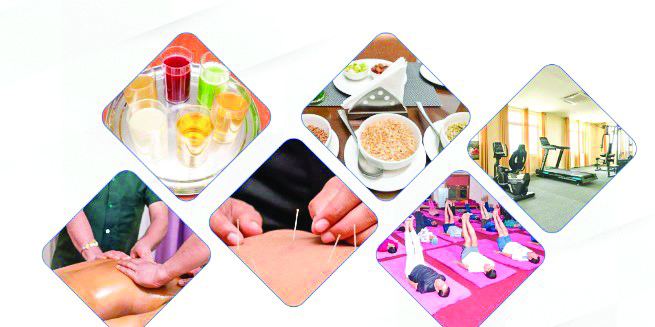
In today’s fast-paced world, where stress, poor lifestyle choices, and environmental factors take a toll on our health, many are turning to alternative forms of healing that go beyond traditional medicine. One such holistic approach is Naturopathy, a system of natural medicine that emphasizes the body’s inherent ability to heal itself. By integrating natural therapies with lifestyle changes, Naturopathy supports overall wellness, focusing on disease prevention, healing, and the interconnectedness of body, mind, and spirit.
The Foundation of Naturopathy
Naturopathy is rooted in the belief that the body has an innate capacity to heal itself. This approach emphasizes a holistic model of wellness, taking into account not just physical health, but emotional and mental well-being as well. By encouraging healthy habits such as a balanced diet, proper sleep, sunlight exposure, regular exercise, and stress management, naturopathy aims to create the optimal environment for the body to restore itself.
An important principle in Naturopathy is the recognition of the five basic elements of nature, known as the Panchamahabhutas—Earth, Water, Fire, Air, and Sky. These elements are considered fundamental to both human health and the natural world. Naturopathic treatment seeks to restore balance among these elements, correcting imbalances that can lead to illness. This process includes the restoration of proper organ functions, the normalization of blood composition, and the removal of toxins through the body’s excretory systems, such as the skin, kidneys, digestive system, and lungs.
Six Principles of Naturopathy
Naturopathy is guided by six core principles, each playing a pivotal role in the treatment and healing process:
1. First Do No Harm: Naturopathic doctors use gentle, non-invasive treatments, ensuring that their methods do not interfere with the body’s natural healing processes. The focus is on creating a healing environment rather than relying on aggressive interventions.
2. The Healing Power of Nature: This principle emphasizes the body’s intrinsic healing abilities. Naturopaths work with nature’s processes, allowing the body to heal naturally by supporting its natural functions and detoxifying systems.
3. Identify and Treat the Causes: Rather than merely masking symptoms, Naturopathy seeks to identify the root causes of illness. These causes often stem from poor lifestyle choices, environmental factors, or inherent dispositions, and by addressing them, lasting health improvements can be achieved.
4. Doctor as Teacher: Education is central to the naturopathic approach. Naturopathic doctors empower patients to take charge of their health by educating them on their bodies, health conditions, and lifestyle choices that can support or hinder their healing process.
5. Treat the Whole Person: Naturopathy takes a holistic view of health, understanding that the body, mind, and spirit are interconnected. Disease is seen not as an isolated issue but as a complex interaction between physical, emotional, and environmental factors.
6. Prevention: One of the main tenets of Naturopathy is that prevention is always better than cure. By identifying potential imbalances before they manifest as diseases, Naturopathy helps patients maintain health and avoid unnecessary suffering.

Basic Principles of Naturopathy
• Body heals itself
• Main cause of disease is enervation
• Deposit of metabolic end-product in the body is disease
• Acute disease is a remedial process itself a cure
• Food is a building material, does not increase the vitality
• Fasting provides an opportunity to the body to heal itself
• Germs do not cause the disease but are found in the diseased condition
• Exercise or physical activity keep the balance between nutrition and drainage
• External treatments whether Allopathic, Ayurvedic or Homoeopathic give only relief, do not cure
• Patient’s own will to get well, determination and faith are necessary things for nature cure treatment
Treatment modalities in naturopathy
A wide range of natural therapies are used in Naturopathy to support healing. These treatments aim to restore balance, detoxify the body, and promote physical, emotional, and mental wellness.
1. Hydrotherapy: The therapeutic use of water—whether in the form of baths, compresses, or steam—helps reduce pain, improve circulation, and promote healing by stimulating the body’s natural processes.
2. Mud Therapy: Mud and clay applications are used to detoxify the body, relieve pain, improve circulation, and rejuvenate the skin. The rich mineral content of mud helps draw out toxins and replenish the body.
3. Heliotherapy and Chromotherapy: Heliotherapy involves the use of sunlight to treat various ailments, particularly skin conditions. Chromotherapy, or color therapy, uses different wavelengths of light to promote health by influencing the body’s energy systems.
4. Massage Therapy: This therapy focuses on the manipulation of the body’s soft tissues to reduce stress, improve circulation, and relieve muscular tension. It also stimulates the body’s natural detoxification processes.
5. Magnetotherapy: This technique uses magnetic fields to reduce pain, inflammation, and promote healing. It has been found to be effective in managing chronic pain and accelerating recovery from injuries.
6. Natural Diet and Fasting Therapy: Naturopathy emphasizes the importance of nutrition in maintaining health. A clean, balanced diet, along with periodic fasting, helps remove toxins and supports the body’s natural detoxification systems.
7. Yoga Therapy: Yoga is an ancient practice that combines physical postures, breath control, and meditation to promote overall health. Yoga helps reduce stress, improve flexibility and strength, and restore balance to both the body and mind.
8. Other Therapies: Naturopathy also includes other holistic treatments such as acupuncture, acupressure, and cupping therapy to balance the body’s energy, alleviate pain, and support healing.

The Holistic Approach to Health
The hallmark of Naturopathy is its holistic approach to health. Diseases and health imbalances are seen as interconnected, with underlying causes often related to lifestyle, emotional factors, and environmental conditions. For example, several mood disorders, such as anxiety, depression, and autism spectrum disorders now have well-established links to functional GI disruptions, whereas GI disease (eg, irritable bowel syndrome, irritable bowel disease) often involve psychological comorbidities associated with alteration of the gut microbiome.
Rather than treating symptoms alone, Naturopathy focuses on identifying and addressing the root cause of health issues. This allows for more effective and lasting healing.
Naturopathy offers a holistic path to wellness by focusing on the body’s innate ability to heal itself. By addressing the root causes of health imbalances and integrating natural therapies, it helps individuals restore balance in their physical, emotional, and spiritual health. With a focus on prevention and education, Naturopathy empowers people to take charge of their health, adopt healthier lifestyles, and ultimately live a longer, more vibrant life.















